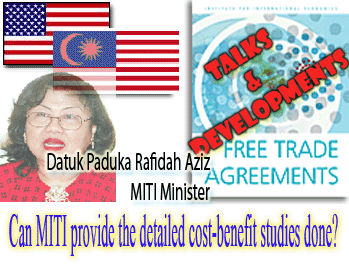Archive for March 24th, 2007
PSCI hearing for Zulkipli/Ramli – review on Tuesday
Posted by Kit in Corruption, Parliament on Saturday, 24 March 2007

The Parliamentary Select Committee on Integrity (PSCI) will be asked on Tuesday to review the “on/off/on/off hearing of Anti-Corruption Agency (ACA) director-general Datuk Seri Zulkipli Mat Noor and whistleblower/former ACA Sabah director Mohamed Ramli Abdul Manan.
This follows the latest development where Ramli’s counsel, M. Manoharan, had given assurance that the issue of sub judice at the PSCI hearings for Zulkipli and Ramli does not arise as the serious allegations of corruption against Zulkipli has no bearing on Ramli’s civil suits against the ACA chief. The civil suit involved non-payment of salaries, pensions and gratuities.
As for the corruption trial of former minister Tan Sri Kasitah Gaddam, both Zulkipli and Ramli are not material witnesses.
Furthermore, the Ramli civil suit could take years to be decided while the Kasitah trial is still in the prosecution stage.
As the PSCI is meeting in Parliament on Tuesday in its continuing inquiry into the Sabah Project I/C scandal, I will raise the letter from Ramli’s counsel and his request for an early date for a hearing for deliberation and decision.
There is now even more compelling reasons why the PSCI should neither flinch nor hesitate from holding hearings for Zulkipli and Ramli if the Select Committee is to remain true to its terms of reference to uphold and promote national integrity. Read the rest of this entry »
Judges who accept bribes – Fairuz must take action or resign as CJ
Posted by Kit in Corruption, Court on Saturday, 24 March 2007

When I was speaking in Parliament on Wednesday during the debate on the Motion of Thanks on the Royal Address and touching on the judiciary as another institution which had suffered in the last 50 years of nationhood in terms of loss of public confidence in its independence, impartiality and integrity, DAP National Chairman and MP for Bukit Glugor Karpal Singh interrupted me to raise a specific question.
Karpal asked whether I agree that as the Chief Justice of Malaysia, Tun Ahmad Fairuz Sheikh Abdul Halim had made it very clear that there are judges who are corrupt, it has become the duty and responsibility of the Chief Justice to lodge a police report to enable a full investigation to be conducted to ascertain as to who are the corrupt judges.
In my response, I expressed my full agreement that to protect the good name of the judiciary, Tun Ahmad Fairuz should either lodge a police against the corrupt judges who “accept bribes” which he had stated publicly or resign as Chief Justice.
There is actually another option open to the Chief Justice — which is to invoke Article 125(3) of the Federal Constitution to set up a judicial tribunal for the dismissal of the judges who accept bribes. This Article provides that the Chief Justice, after consulting the Prime Minister, is empowered to represent to the Yang di Pertuan Agong for the establishment of a tribunal for the removal of a judge for judicial misconduct.
Tun Ahmad Fairuz must take action against the judges he had accused of taking bribes, whether by lodging a police report or invoking Article 152(3) of the Federal Constitution, and if he not prepared to do either, he should resign as Chief Justice to protect the reputation and integrity of the Malaysian judiciary.
There can be nothing more serious against the reputation and integrity of judges than the charges which the Chief Justice had levelled in his speech during the swearing-in ceremony of eight new judicial commissioners on March 1 – that there are judges who accept bribes. Read the rest of this entry »
Why Iskandar Development Region will fail
Why Iskandar Development Region will fail
by Richard Teo
The response from the foreign investors to the Iskandar development Region is quite evident. After few months from its launching, the Iskandar Development Region has received lukewarm response from the foreign investors.
This prompted Tun Musa Hitam, a member of the Iskandar Development region Authority(IRDA)advisory Council to say unequivocally that ‘it was time to give up the New Economic Policy (NEP) for the success of the Iskandar development Region(IDR).’
On 22nd March 2007, our P.M declared that six sectors would not have to have Bumiputra equity participation.
For 50 years our malay political masters have deemed fit to cling to the NEP policy and now without much persuation they have willingly relinquish that condition for the Iskandar development Region. Why?
The simple reason is that Malaysia has missed the boat. Most of the FDI’s that we are targeting have taken flight to China’s economic region of Shenzan, Hangchou and to India’s Mumbai and Bangalore region.
Of late whatever FDI left have gone to Vietnam. So who are we trying to attract to the IDR? In order to answer this question let us examine the profile of the investors in Malaysia. Read the rest of this entry »
Malaysia-US FTA – Questions for Rafidah
Posted by Kit in Economics, Parliament on Saturday, 24 March 2007

On Tuesday, Minister for International Trade and Industry, Datuk Paduka Rafidah Aziz, gave a 21-page reply to questions on the Malaysia-US FTA talks and developments.
Rafidah said that the sovereign right of the government to make and implement certain national policies for the interests of the rakyat and country is one of the fundamental issues that are non-negotiable for Malaysia in any bilateral FTA.
Malaysian sovereignty
I want to raise 3 matters of vital public importance that are on the negotiation list.
First is the issue of the mandatory labelling of genetically modified organisms (GMOs) and products containing GMOs. The Biosafety Bill that has passed the first reading in this House is necessary to safeguard public health and the environment. An important provision is the one that requires mandatory labelling, and we understand that Draft regulations for labelling of genetically modified food are ready and notified to the WTO. For consumers who may have allergenic reactions to certain GM products or have religious reasons to reject such products labelling is essential.
I raise this because the US Trade Promotion Authority (TPA) Act expressly states that labelling of biotechnology products is a practice that should be eliminated as it decreases US export opportunities when consumers choose not to consume GM food.
The US Biotechnology Industry Organization (BIO) and the AMCHAM Malaysia/US Chamber of Commerce have opposed mandatory labelling of genetically modified products or foods in their public submissions to the US Trade Representative. In particular, AMCHAM Malaysia/US Chamber of Commerce state that such labelling “should be firmly opposed by the U.S. in the FTA Negotiations”.
Many countries (such as Japan, China and many European countries, and even Australia which signed an FTA with the US) already require mandatory labelling. This is consistent with the WTO Agreement on Technical Barriers to Trade which states that “technical regulations shall not be more trade-restrictive than necessary to fulfil a legitimate objective”.
The legitimate objectives include “national security requirements,
prevention of deceptive practices, protection of human health or safety, animal or plant life or health, or the environment” (emphasis added). The prevention of deceptive practices includes product information and labelling, so it is clearly within our sovereign right to have mandatory labelling of GMOs and GM products.
Under the Codex Alimentarius Commission, the joint WHO/FAO body regulating international food standards, the Committee on Food Labelling has been discussing a global standard for mandatory GM food labelling. The draft standard on GM labelling has support from a majority of the Committee, including Malaysia.
Is this one of the areas of national sovereignty that will be non-negotiable?
Read the rest of this entry »
